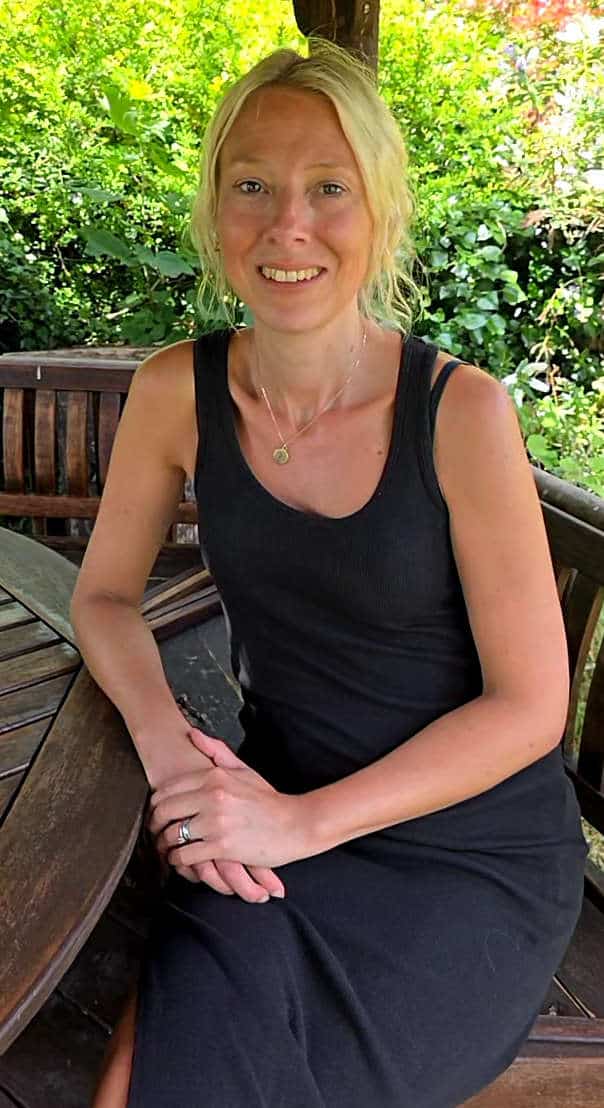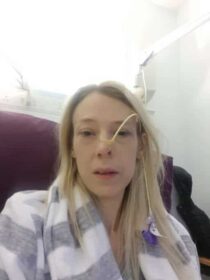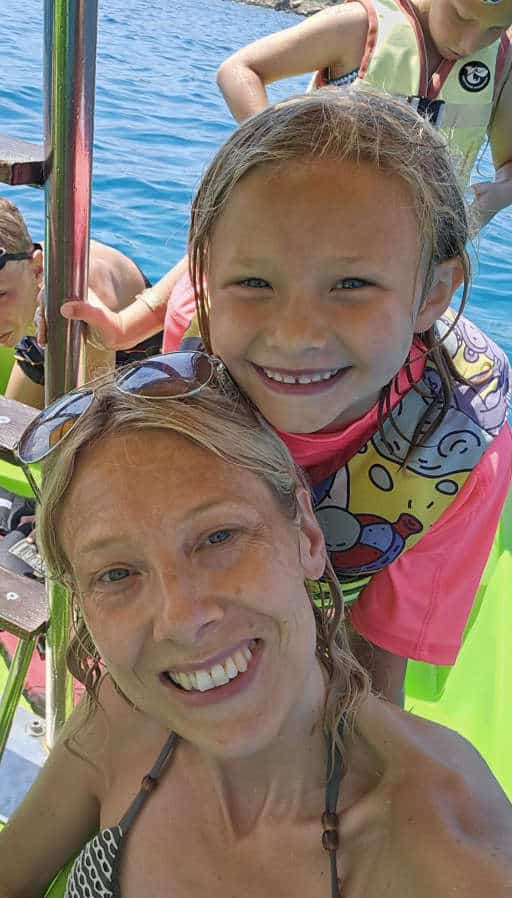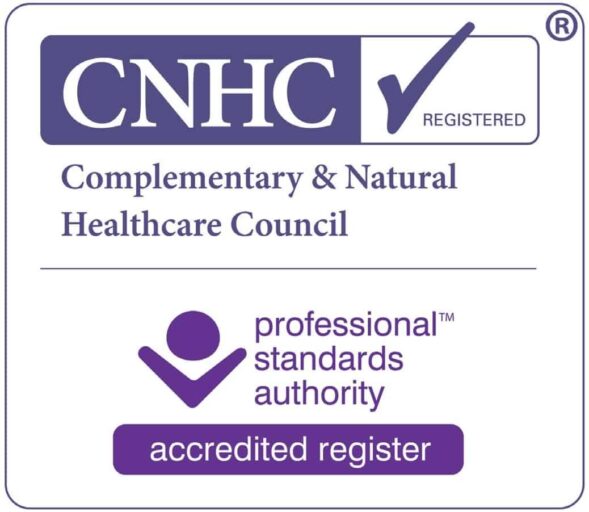About Emily Kennett’s journey
Beginning of the Journey (COVID hits)
My journey began in March 2020, just as COVID hit. For me, it felt like the beginning of my world falling apart.
I’d suffered with IBS for as long as I could remember. In my 20s, I began experiencing aches and pains that would come and go. By my 30s, I was dealing with intense bladder pain and was diagnosed with interstitial cystitis (IC). At the time, I was prescribed medication to mask the symptoms. When I was in pain, I just wanted relief, anything that would allow me to ignore and get back to living my life.
Gut Feeling / Surgery Crossroads
Years passed, and I started having gallbladder pain. The doctors’ solution? Remove it. “No big deal,” they said. It’s a common operation, after all. But for me, it changed everything.
In 2018, I was scheduled to have my gallbladder removed. Four days before the surgery, I found out I was pregnant, a complete shock, especially after struggling to conceive my other two children. Looking back, I believe this was a sign not to go through with the operation. Something, someone, was put in my path to stop me. I gave birth without complications and had no health issues for nearly a year after. But then the pain returned.
I rejoined the surgery waiting list. After months of waiting, the time came. Ironically, I was feeling good again just before the procedure. Sitting in the waiting room, I had a strong gut feeling not to go through with it. I even told my husband. But I brushed it off as fear, believing life would be better after surgery.

Medical Mayhem and Pain
Five days later, the pain returned, worse than ever. Doctors couldn’t figure out what was wrong, so they gave me more medications: GTN, Buscopan, and eventually diazepam. That marked the beginning of my journey with benzodiazepines. At first, they felt like a miracle drug but I had no idea the toll they would take long-term.
From this all the other medications I took to mask my other symptoms, like bladder pain worsened. New medications did nothing. I tried lots just to get some relief. I saw a practitioner in London who claimed to treat IC, but her supplement regimen made me worse. Another advisor recommended bone broth to heal my “leaky gut.” She was right about the gut issues, but wrong for someone like me with MCAS (Mast Cell Activation Syndrome). My histamine levels skyrocketed. I started reacting to everything. At the same time, our house was being renovated, so we moved in with my parents. What I thought would be a healing break became my worst nightmare.
Misunderstood by the System
Their house was filled with black mould. My body deteriorated rapidly, I was down to eating only two foods, lost significant weight, couldn’t brush my teeth without reacting to the toothpaste. I was in constant pain, confused and terrified. How had things spiralled so far out of control?
My life was now consumed with this, constantly trying to fix myself as it seemed no one else understood. Every day was filled with fear: “Will I ever get my life back.
“Do you want to die? Just eat!”
I kept researching and stumbled across MCAS again and again. But I resisted it, it sounded like a life sentence. The more I read, the more hopeless I felt. I was already under the care of two gastroenterologists, an endocrinologist, a gynaecologist, a rheumatologist, a nephrologist, and more. I even saw an allergy specialist privately who insisted I didn’t have MCAS.
My GP didn’t believe me. One day, she shouted at me: “Do you want to die? Just eat!” I changed GPs and found a kind woman who genuinely listened. She gave me a few antihistamines to try but admitted she was out of her depth. I was so unwell by then that I faced hospital admission for tube feeding.
The hospital didn’t want me. They said it was an eating disorder, but the eating disorder unit wouldn’t take me either. I didn’t fit anywhere. Eventually, I was admitted. My kids were pulled out of school to say goodbye. I still remember the secretary standing with them crying. Due to COVID, there were no visitors so I didn’t know when id see them if at all. The fear that covid spread round the world, with me being so sick and not vaccinated I wondered if id even pull through at all.
I arrived at the hospital hopeful I would finally be understood. But the doctor who had coordinated my care had already left. I was told to eat of the menu. I couldn’t. The feeding tube was delayed, and when it was finally placed, they went to use the wrong formula, full of additives I couldn’t tolerate. I refused it, then was told the pharmacist was closed so there was nothing else.
They allowed my husband to bring me food in. I wasn’t allowed to see him, for it to be just passed through the door. It was the first food I had in 36 hrs from being left there, so long my tummy couldn’t take it. I ended up vomiting and the tube came out.
The next day, I was yelled at again: “Just eat! I couldn’t, I thought the people in here were going to understand but they didn’t. Again my husband had to bring me food, after eating though my body couldn’t handle it and I collapsed and was put on a drip. The hospital was chaotic, patients screaming, staff didn’t seem bothered. It then hit me: this place wasn’t going to help me. I called my GP. They begged me to stay. I called my husband. I left.

“I remember pulling over and crying, what was I going to do?”
Emily Kennett
For me, that was the best decision I made, but my kidneys were failing, and I was getting sicker. I was not in a good way. I was under a nephrologist, and the following week I saw him.He sat me down, telling me I had an eating disorder and that I wasn’t a good example to be bringing up kids. My world then fell apart. It was the one time I didn’t have my husband with me at an appointment.
I remember leaving, being told nothing was wrong and that I was doing this to myself. I left screaming, but everything around me seemed like it had paused. Driving back, with my phone constantly ringing as my family heard the state I was in, I didn’t know how I was going to pull through this.
It was the first time I had lost all hope. I’m crying as I write this, as it still shocks me the way people who are supposed to care for us… don’t. I remember pulling over and crying, what was I going to do? How long would it be before my family started to believe the doctors?
My First Glimmer of Hope
I then googled MCAS specialists again. Two I knew had long waiting lists. I was already on Tina Peers’ list, but I wrote to them, telling them what had happened to me. What did I have to lose? I was begging for help.
Monday morning, I got my first call. The doctor spoke to me there and then, confirmed my diagnosis, that I was right, and gave me some meds and advice. An hour after that call, I got an email from Tina Peers’ secretary, there had been a cancellation. Did I want to see her that afternoon? Oh my God, I had hope again.
I had read about Tina Peers and had, months earlier, asked to be put on her books, but there was a five-month wait. She put me on more medication and taught me how mould was a big trigger, and that I needed to leave my parents’ home. She also listened to me and for once I felt like I wasn’t crazy. . I believe she is an angel who walked into my life when I needed it most. She rebooked to see me in a few weeks and I left with a feeling of hope.
What are the chances? Two doctors with long waitlists both saw me on the same day, just two days after I thought there was no way out. I just want to show you that things can turn around, just like that.
Unfortunately, things took another turn for the worse. Tina called me the following Saturday to tell me there was an email going around between the specialists, they were trying to section me with an eating disorder. I was losing control of my life again. Thankfully, she managed to stop it but she told me I must move out of my parents’ and get away from the mould.
We moved into an outbuilding, one room, all five of us. But it didn’t matter as we were all together. Being out of there, my symptoms seemed a little better, but there was still a lot of pain. I was home, though, and that’s all that mattered.
Discovering the Mind-Body Link
I couldn’t go outside without reacting, so I would sit at the window and watch the kids play. I couldn’t eat, use any products, No one could visit, as I would react to their scent. I became allergic to the world.
Then one day on TV, a lady called Marisa Peer came on and started talking about the mind. It caught my attention. I started to listen to her more and more, then Joe Dispenza, and how powerful our minds are. Slowly, I was starting to learn another way.
Bailey the Dog
All the thoughts you think in one day, 90 percent are the same as the day before, so if your thinking the same thoughts your making the same choices, same choices = same behaviours, same behaviours = same experiences. Same experiences = same emotions and those emotions shape how you think act and feel = your personality and your personality creates your personal reality. If you don’t change your thoughts, how can anything change. This stuck with me. I started looking more into the mind and how people could heal.
I trained in hypnotherapy, which I loved, and I gradually started to feel a bit better. Still lots of symptoms, only two foods, and eight different medications, but I was living a little. I started to feel joy. As time went on I got more foods back, yes I still had pain but I was living.
I then decided to get a dog. After what the children had been through, and for me, I needed something to love. My beautiful Bailey came into my life.
I remember bringing him home and reacting to him, but I was determined not to let MCAS stop me. Later on, I found out my one true allergy is dogs, but I still have him and wouldn’t change that. He brings me so much joy, and I guess the love has outweighed the reactions.
Grounding and Reconnection
He got me out into nature again. He also introduced me to a lady in the park, who is now one of my best friends. She understood my condition, she had recently spoken with a woman flying to Canada as a last resort for treatment, since there was no support here.
What are the chances? Normally, when you say “MCAS” to someone, they’ve never heard of it. She put me in contact with that woman, and I followed her journey out there, never expecting I’d follow in her footsteps a year later.
January
I was doing well, the best I’d managed to get myself. I was working on my brain, taking time for me, being in nature, going to sound baths, and I’d started working with clients doing hypnotherapy for MCAS.
Hypnotherapy was great for relaxing the client and helping with symptoms, but if there was a trigger, the symptoms would come back full force. That’s when I realised nervous system regulation also needed to be in place.
Healing Energy
I started trying new treatments. I felt well, was getting more foods back, but then I used a machine that pushed my body into a fast detox. In a body full of mould, that’s not a good thing.
I went into a downward spiral: I lost all foods again, my thyroid flipped from under-active to overactive, my weight dropped, and once again, people started mentioning the words “eating disorder.” How was I back here again?
I had put off this appointment for so long, fearing exactly that outcome. How could I leave my three young children for months, or even a year?
Emily Kennettt
At that point, my worst symptom wasn’t even MCAS, it was the constant pain in my liver and gallbladder area. Now I know my bile had become so thick it couldn’t move, and that was what caused the pain.
Mentally, I felt like I was falling apart. I couldn’t believe how much my thyroid was affecting my mental state. That’s when I finally booked to speak to a doctor in Canada.
He couldn’t believe I was on 15 mg of Ketotifen, when the limit is 2 mg. “How are you even awake?” he said. It wasn’t helping. He told me, “I can’t treat you remotely. You need to come to Canada.”
I had put off this appointment for so long, fearing exactly that outcome. How could I leave my three young children for months, or even a year?
On top of that, my gallbladder removal had caused another condition: Sphincter of Oddi dysfunction (SOD), and the pain was unbearable. I could barely move. Now I realise it was also connected to MCAS. This condition can affect any part of the body.
To continue the process, I had to complete endless forms and was referred to an inherited trauma specialist: Mark Wolynn. He wrote the book It Didn’t Start With You, and there’s also a series on Netflix called Another Self, both really helped me understand what I was dealing with and help my family understand.
At the time, I couldn’t see how generational trauma could possibly relate to my physical symptoms. But I was classed as an emergency, and managed to get a session with him a couple of weeks later.
We spent two hours talking about my family line. He also taught me how to pull energy back into my body. I had no life force left, and somehow, just spending that time with him brought something back to me. He gave me life again.
Every day after that, I practiced what he showed me. But honestly, it was his energy, his vibration, that sparked something. I went overnight from being bed-bound to walking the dog and going out again.
My friends were shocked. They asked me to teach them what he had done. He gave me hope, if he could do that just by talking, then maybe there was another way.
Connection with Others
Later I saw a nutritionist through the Canadian doctor. I told her about Mark Wolynn, and she laughed. “That’s not going to get you better,” She completely shut me down. I never worked with her again. I didn’t need her negativity. And once I arrived in Canada, I found out many other patients had struggled with her too, some were even worse off after seeing her. Trusting my own instincts not to work with her was the right decision. If you feel something isn’t right, don’t let anyone tell you different.
While I waited to travel, I started a brain retraining program. I’d done one before, without much success, but this time I tried again. I still had a 2 month wait to go to Canada. Slowly, I learned that my nervous system was stuck in a constant fight-or-flight state. MCAS wasn’t that I was mentally ill. I learnt my nervous system plays a huge role in how my body responds to the world, and when it’s stuck in survival mode, it thinks everything is attacking it, make MCAS symptoms so much worse.
Learning tools gave me back a sense of control. And when things got hard in Canada, those tools helped me stay grounded.
The clinic wasn’t like a regular hospital. They treated the whole person, body, mind, and spirit. I was open to try anything. I remember the doctor telling me:
“Unless you target all areas, it’s hard to reach full healing.”
Clinic life wasn’t easy. In the first week, I had so many tests I could barely speak. My husband had to stay an extra week because I couldn’t even work out how to get cash from a machine.
I’d never been left alone like that. When he finally left, I cried every day. I was grateful to be there, but I couldn’t quite understand how my life had ended up like this. Not being with my children and even knowing if I was wasting my time and money.
I had IVs daily, and being around a lot of patients with MCAS meant we were sometimes triggering each other, but it also meant I made some good friends. You end up becoming a little family, surrounded by people who fully understand. From being so alone in this, there were now people the same as you.
I would spend eight weeks there at a time, then go home for a month to see my family, then back again for another eight weeks. The second time I went back, I got my own apartment, but suddenly, I started feeling really sick again. I began experiencing new symptoms, my brain felt like it was going to blow out of my head, burning brain, ears, tongue. Electrical feeling all down my spine. I thought I had MS.
We realised the EMFs (electrical and magnetic fields) in my apartment were dangerously high. Something I never considered before had made me feel so paralysed. Just turning the cooker on would make my legs want to collapse. I never experienced this before. Back home I live in the country, where EMFs aren’t so high. Here is full of 5G towers. I had to have a brain scan and the doctor said, “If you can’t find anywhere safe to live, I can’t treat you.” Another big blow.
Patients helped me and two gave me EMF readers. I spoke with the landlady, who was big and scary and didn’t believe me to start, but then said she could see how sick I was and let me try another apartment across the hall. Just the opposite side of the building, there was minimal EMFs. It was still being occupied, so until it was free, I left Canada early and went home.
Connection, grounding, and nervous system regulation
We tried one just across the hall, and the EMFs were low. That was all it took. Just moving across the hallway changed everything. I had hope again. But it wasn’t available for a few weeks, so I decided to go home early to help calm my system down.
When I got home, the doctor said, “Go outside. Be in the sun. Ground.”
I started spending a lot of time outdoors grounding. I know, it sounds crazy. Woo-woo, right? Even my husband still thinks that. But he also saw me get better.
There’s actually a lot of scientific proof that grounding, or earthing, connecting to the earth, is good for our physiology. Think about it: the more we’ve moved away from basics like sunlight, touching the earth, eating real food, and simply breathing… the more unwell, the more dysregulated we’ve become.
I spent six weeks at home before returning to try again. When I went back, I felt really good, even the doctor was surprised by how much better I seemed.
Finding connection outside the clinic
When I went back, I knew I needed connection outside the clinic too. During the week I was okay, busy with treatments, but weekends and evenings felt so lonely. With the seven-hour time difference, I couldn’t just call home. I’d be jealous that in England their day was already done, while I was just trying to get through mine. I was wishing my life away.
So I looked for a yoga class. From my first trip, a lady I’d spoken to remembered I liked sound baths and told me about a drumming community that met every Friday, a big group of kind, welcoming people just having fun together. Id never done drumming but anything to get me out.
I was meant to go that Friday, but had the worst day since being there in the clinic. My husband just said, “Get out of the apartment, you need to get out.”
I remember sitting in the kitchen, asking for help to get out of this place I was in.
Emily Kennett
I went to the drumming event. As I walked in, an older man was sitting in the corner , I started chatting to him. He then got up to go in but first came up to me and said,
“If things aren’t working out for you, you’re not seeing the bigger picture.”
Then he disappeared.
It stopped me in my tracks. It sounded familiar.
He came back and I asked him to repeat it, and he did. That’s when I realised… it was a quote from a book I was reading at the time.
We hadn’t spoken about books. Why did he say that? How did he know?
That was the first of many little synchronicities that started to give me hope.
Connection changed everything
I made so many friends outside the clinic, people I’d now call family. They would pick me up constantly, take me everywhere they went. I became particularly good friends with a band. Whenever they rehearsed they took me. I felt so lucky to have them. If I’m honest, if I hadn’t found them, I don’t think I would’ve stayed. I learned what real connection was out there. They truly cared for me. And I believe a huge part of my healing came from the safety my body felt around them. I would sit in the clinic having a iv telling people all the places id been. I remember saying to someone who lived in Canada. Your so lucky to have these people but they turned around and said no. you’re the lucky one who found them and they were right.
Patients started coming up to me asking, “What are you doing to look so well?”
Id tell them different things, nervous system regulation, family constellations, new binder, connecting outside feeling joy. But most patients first go to was the supplement, the drug. There is so much more to our bodies than just taking a pill to fix us, we have just been wired this way.
Expecting the ivs to do all the work. Yes, the IVs helped, especially with moving bile for me and helping cells. But I also saw patients who felt worse from them. Some felt better for a while, but after one stressful event, they were back again.
Why had some people been there for years on and off?
Because their only way of healing was through a drug or a supplement. And yes, they can help. But what I’ve learned for true, lasting healing is this
The top one is nervous system regulation. If we want our body to accept anything, it needs to know safety. That’s number one. If your body doesn’t feel safe, no treatment will work. Your body is too shut down to accept anything, it’s just trying to survive.
Number two for me is connection. Your body is searching for connection. This could be connecting with a friend, or connecting back with nature. Connecting back to you. This is showing your body we see you and we are listening. You need to stop and listen to your body. The world has got so busy, pushing us to our limits to achieve all the time, we have lost ourselves. If MCAS could be changed from you being handed a life sentence, to really seeing it as a way of stripping everything you once had back to nothing and starting again, finding the real you that has been hidden under so many layers of beliefs, traumas, parts you play.
Maybe the way you have been living was not the way you were supposed to live in the world. What if your body was tired of being ignored? What if this ended up being the biggest lesson of your life?
I’m now home, have slowly taken myself off all medication, yes, everything. From being told over here I would be on medication for life. I’ve learnt to listen to my body. Do I still have flares? Yes, but not often, and if I do, they don’t stay.
Do I appreciate my life a lot more? Yes. As I never thought I’d get to do anything I loved again. Can I eat in a restaurant? Yes. Go on holiday? Yes. Eat big bars of dark chocolate that are full of histamine? yes.
A Little Note from Me to You
“I care about your future life”
Emily Kennett
This doesn’t have to be a life sentence.
It might feel like this will never change , I get it, but I promise there’s still hope.
I’m living proof of that.
Was it quick? No.
Was it worth it? Every single step.
And if I can find my way back, so can you.
You’re not broken. Your body’s just been trying to protect you.
Let’s help it feel safe again, together.
If you just take one thing from my site, there is always hope. Don’t believe what everyone says, and if I can do it, why can’t you?

Emily Kennett
I am a fully qualified hypnotherapist and NLP practitioner and trained at the Surrey institute of clinical hypnotherapy. I am supporting people both online and in person. I have a special interest in nervous system regulation, helping people to find their way back to health.




